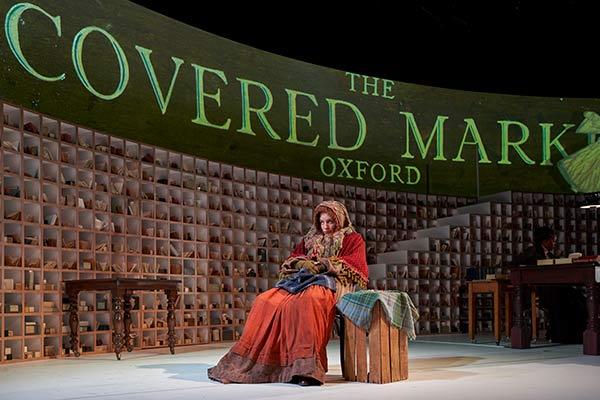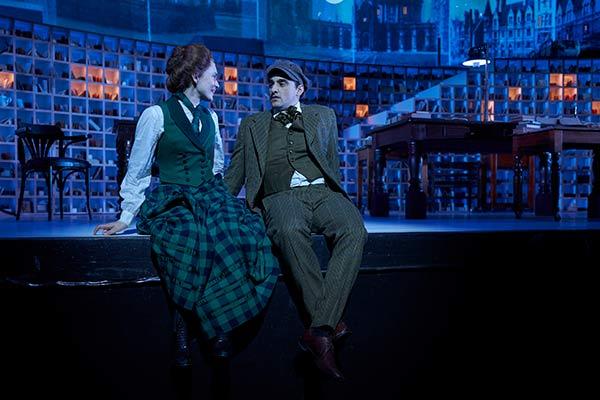None of the magic and little of the detail is lost from Adelaide author Pip Williams’ international best-seller, 'The Dictionary Of Lost Words' in State Theatre Company South Australia’s spellbinding, book-binding adaptation, starring 'The Lost Flowers of Alice Hart''s Tilda Cobham-Hervey.
Since the birth of Sumerian Cuneiform on clay tablets, or perhaps earlier, the written word has shaped the arc of human history. Language, in all its forms, not only facilitates communication, the broad dissemination of ideas, across regions and generations, but also places boundaries around what we know and don’t know to be true, what we can and cannot perceive. If we don’t possess a word for an emotion, we may still feel it, but we may not understand it, and we will struggle to convey our inner worlds to others and find solace in our shared existence.

Image © Sam Roberts
Pip Williams discovered 'Dictionary'’s protagonist, Esme Nicoll, deep in the archives; an exceptional wordsmith, who grew up in the Scriptorium that birthed the Oxford English Dictionary, who was locked out of the corridors of academia in patriarchal Victorian England and almost lost to history, until her accomplishments were trumpeted by her daughter, who was adopted at birth, in a speech at the 1989 Convention of the Australian Lexicography Society in Adelaide. Pip brought Esme’s untold story to the globe from behind a keyboard in the lush Adelaide Hills.
Because words have always been there for us, and the dictionary has too, the wonder of their creation, the scale of their power, can be underestimated. Pip’s work, and this adaptation, is a reminder. With the aid of Jonathon Oxlade’s set and Trent Suidgeest’s lighting design, the Scriptorium’s paper-stuffed pigeon holes becomes like Wonka’s chocolate factory. For motherless Esme, played from age four to adulthood by Tilda Cobham-Hervey, the space beneath the desk of the Scriptorium is her secret Aladdin’s cave, a fantasy world where the grief of her mother’s absence can’t find her, until a slip of paper with her mum’s name on it appears. Lily was classified as “a woman’s word” by the men of the Scriptorium, so it was discarded into the fire. Esme rescues it. A hand in the flames is less painful than losing mum again. An obsession with rescuing and compiling lost words, women’s words, is born.

Image © Sam Roberts
Pip William’s 'The Dictionary Of Lost Words', and playwright Verity Laughton’s taut adaptation, is both an homage to humanity’s greatest creation, words, but also a searing inquisition of the perils of entrusting a select few with the power of being the language gatekeepers but, also, implicitly, the dangers of opening the floodgates. History, as we know, has long been written by the winners, but so too has truth more generally. Our courtrooms are presided over by judges, still mostly men, still mostly educated in elite private schools, who determine the common law that applies to the common people. Peer-reviewed medical studies, reviewed by mostly male peers, still disproportionately use men as the subjects, with the assumption that male physiology can be extrapolated to female and non-binary bodies. Representative democratic institutions legislate, enshrining governing words into statutes, but is still not representative. Yet while, in Esme’s time, publication was a painstaking process, now publishing online has been democratised, rendering truth increasingly indiscernible. Unlocking the gates has let the monsters in. Where should the balance be drawn?
Tilda Cobham-Hervey brings the enigmatic star power that is needed for a role like Esme. Having grown up on the stage as a circus performer and now, having transitioned to the big and small screens, Tilda knows how to captivate a live crowd, while also diligently and meticulously being attentive to the microscopic details that a camera will pick up. While it may be scarcely visible, Tilda holds her rescued slips of papers in Esme’s functioning fingers; when she encounters male suitors, she self-consciously hides her scarred hand, sometimes forgets, then swiftly conceals her shame again. Like Esme, she’s a force of nature. Playing Esme’s kindly patrons, her father Harry (Brett Archer) and Sir James Murray (Chris Pitman) are endearing eccentrics, products of the patriarchy, but not the worst manifestations. The remaining members of the ensemble, Rachel Burke, Ksenja Logos, Raj Labade, Angela Mahlatjie and Anthony Yangoyan take on multiple roles. Angela is striking as stage starlet Tilda Taylor, while Ksenjja and Rachel weave comedic gold as foul-mouthed Mabel and bondmaid Lizzie Lester. The accent coaching of Jennifer Innes is superb.

Image © Sam Roberts
Laughton’s adaptation and Jessica Arthur’s direction ensure that 'Dictionary' covers immense ground in a non-stop three hours. A flashback scene towards the end is seamlessly choreographed. There are some pivotal moments, such as deaths of main characters, where there is little time spent in reflection, but this may be both by design, as well as by necessity. The play can’t go for four hours, but also a woman’s lot in Victorian England was to have the morbs, grief, but to plough on anyway, because there was no other choice. A panoramic screen, atop the rows of pigeon-holes, projects the happenings on the Scriptorium desk, and this innovative device is pivotal.
While 'Dictionary'’s next stop is the Sydney Opera House, that will very likely only be the beginning. Like the written word, and Pip Williams' bestseller, this is a production that will spread to everywhere that stories are told.
★★★★★

